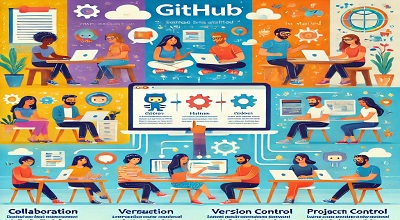GitHub
GitHub is a popular platform for hosting and sharing code, collaborating with other developers, and managing software projects using the Git version control system. Here are some common uses of GitHub and steps to get started:
Uses of GitHub:
- Hosting Code: You can host your code repositories on GitHub.Allowing you to store your project files and collaborate with others.
- Collaboration: GitHub provides tools for collaborating with other developers on projects. You can work together on code, track changes, and manage contributions using features like pull requests and code reviews.
- Version Control: Git, the version control system underlying GitHub, helps you manage changes to your code over time. You can track revisions, revert changes, and maintain a history of your project’s development.
- Issue Tracking: GitHub offers an issue-tracking system where you can report bugs. Suggest features, and discuss tasks related to your project. This helps in organizing and prioritizing work.
- Documentation: GitHub provides support for hosting project documentation, making it easier to maintain and share information about your project.
Getting Started with GitHub:
- Create an Account: Visit the GitHub website (github.com) and sign up for an account if you don’t already have one. You can choose a username, provide an email address, and set a password.
- Set Up Git: Install Git on your local machine if you haven’t already. You can download it from the official Git website (git-scm.com) and follow the installation instructions for your operating system.
- Create a Repository: Once you’re logged in to GitHubs, you can create a new repository by clicking the “New” button on the upper right corner of the screen. Give your repository a name, and description, and choose whether it should be public or private.
- Clone the Repository: To work on a repository locally, you’ll need to clone it to your computer. On the repository page, click the “Code” button and copy the repository URL. Then, open a terminal or command prompt, navigate to the directory where you want to store your project. Run the git clone command, followed by the repository URL.
- Make Changes: Once you’ve cloned the repository, you can make changes to the files in your project using a text editor or an integrated development environment (IDE).
More here…
- Commit Changes: After making changes to your files, you’ll need to commit them to the repository. Use the git add command to stage your changes. The git commit command commits them to the repository with a descriptive message.
- Push Changes: Once you’ve committed your changes locally. You can push them to the GitHubs repository using the git push command. This will upload your changes to the remote repository and make them available to others.
- Collaborate: You can invite other GitHub users to collaborate on your project by adding them as collaborators. By allowing them to fork your repository and submit pull requests,.
- Explore Features: GitHub offers a wide range of features beyond basic version control. Such as branching, merging, code reviews, and project management tools. Explore the GitHubs documentation and tutorials to learn more about these features and how to use them effectively.
Conclusion
By following these steps, you can get started with GitHub and begin hosting your code. Collaborating with others, and managing your software projects more efficiently.
